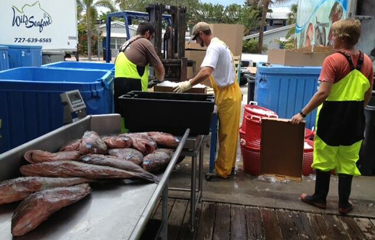Commercial fishermen in the Gulf of Mexico said they were shocked to see their share of the red grouper quota cut by 600,000 pounds.
A statement released Tuesday, 29, June by the Gulf of Mexico Reef Fish Shareholders’ Alliance said the reallocation to recreational fishermen means a loss of about USD 3 million (EUR 2.5 million), a significant loss for “fishing families.” They also fear it could lead to overfishing of the species.
On Friday, 25 June, the Gulf of Mexico Fishery Management Council set a catch limit of 4.26 million pounds. For commercial fishermen, the limit was set at 2.53 million with a catch target of 2.4 million. That represents 59.3 percent of the allocation. For anglers, the catch limit is 1.57 million pounds.
The council said the most recent stock assessment showed the biomass of spawning red group at a historical low. That assessment led officials to revise overfishing limits and catch limits.
“In the commercial sector, a lower annual catch limit will reduce the amount of allocation distributed for each share of red grouper individual fishing quota,” the council said in a statement. “The lower recreational annual catch limit is expected to shorten the fishing season, and once the amendment is implemented, a recreational in-season closure may occur.”
Eric Brazier, deputy director of the shareholders’ alliance, said in the group’s statement that commercial fishermen were disappointed the council opted for a “false promise of short-term gain” over sustained conservation. Brazier added the move may lead to more discards of dead fish.
“We look forward to working with NOAA Fisheries and the Department of Commerce to correct this egregious error and avoid harm to commercial fishing families that have worked hard for generations to feed the nation, be accountable to quotas, and protect our fishery resources for the long term,” he said.
The Gulf Coast Seafood Alliance, representing regional seafood harvesters, distributors, and the restaurants serving their products, told National Fisherman it was “deeply disturbed” by the proposal. It blamed former U.S. Commerce Secretary Wilbur Ross for choosing council-members who favored recreational fishing interests over the commercial fishery.
“This decision demonstrates the success of an ongoing effort by the well-funded recreational fishing lobby to take a disproportionate share of the quota for their personal enjoyment, and for the profit of companies supplying fishing gear and recreational vessels,” it said. “Of America’s approximately 330 million citizens, only 38 million are holders of recreational fishing licenses, tags, permits, and stamps, according to the U.S. Fish & Wildlife Service. The 11 percent of Americans who enjoy fishing recreationally, who can afford the gear, boats, and charters needed to participate in this sport, certainly have the right to access this resource, but they should not have the right to monopolize the resource. The other 89 percent of Americans nationwide who do not hold fishing licenses, tags, permits, or stamps also have the right to access domestic seafood resources, which they currently do through the labor of our commercial fishermen and distributors, who supply wild-caught seafood to their markets and favorite restaurants.”
The council must now submit its proposed changes in Reef Fish Amendment 53 to the National Oceanic and Atmospheric Administration, and the decision to change the quota must be approved by U.S. Secretary of Commerce Gina Raimondo before it can be implemented. The group called on Raimondo to reverse the decision.
“As the former governor of Rhode Island, Secretary of Commerce Gina Raimondo unquestionably understands the need to balance the rights of recreational fishing participants with the rights of citizen consumers,” it said. “Like our Gulf Coast, the Rhode Island economy has for centuries supported fishing interests – both commercial and recreational – as well as a robust tourist trade that sustains restaurants, markets, and hotels filled with guests who enjoy local seafood. We must continue developing methods to share our nation’s coastal resources and not exclude one sector in favor of another.”
The Gulf Coast Seafood Alliance said a failure to reverse the changes will harm the regional economy and result in more fish being imported into the United States, deepening the country’s seafood trade deficit.
“Commercial fishing is just as important to the gulf tourist economy as recreational fishing, even though the benefits are often overlooked. If commercial fishermen can’t catch enough local species like grouper, the impacts will ripple through the critically important restaurant industry. Less grouper to catch means less grouper for restaurants, and that will inevitably lead to higher prices at the table,” it said. “Red grouper is one of the best-selling local seafood items at gulf restaurants. Without ready access to it at prices customers feel comfortable paying, some restaurants may have to consider supplementing their wild-caught products with farm-raised fish from overseas. Fresh, local seafood is one of the reasons people come from across the country to the Gulf of Mexico; A restaurant industry without it would be far less appealing.”
Photo courtesy of Gulf of Mexico Reef Fish Shareholders Alliance







